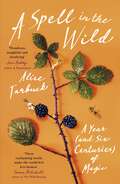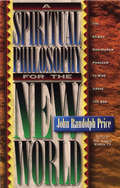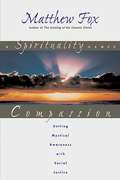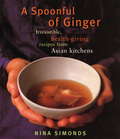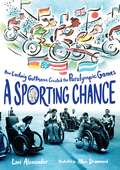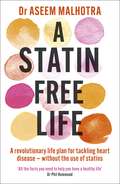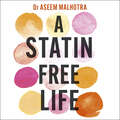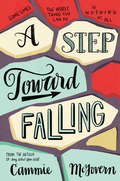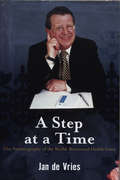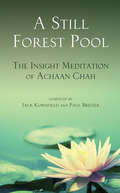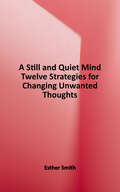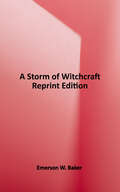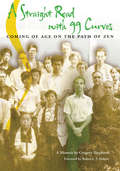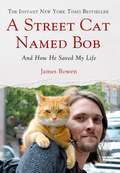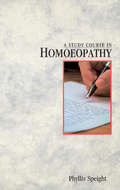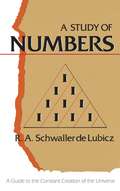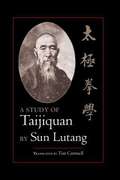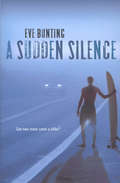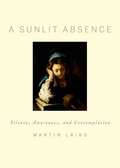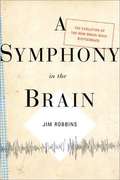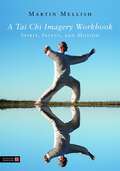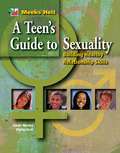- Table View
- List View
A Spell in the Wild: A Year (and six centuries) of Magic
by Alice Tarbuck'Witches occupy a clear place in contemporary imagination. We can see them, shadowy, in the corners of the past: mad, glamorous, difficult, strange. They haunt the footnotes of history - from medieval witches burning at the stake to the lurid glamour of the 1970s witchcraft revival. But they are moving out of history, too. Witches are back. They're feminist, independent, invested in self-care and care for the world. They are here, because they must be needed.'What it means to be a witch has changed radically throughout history; where 'witch' was once a dangerous - and often deadly - accusation, it is now a proud self-definition. Today, as the world becomes ever more complicated and as we face ecological, political and economic crisis - witchcraft is experiencing a resurgence. Witches are back.In A Spell in the Wild, Alice Tarbuck explores what it means to be a witch today. Rooted in the real world, but filled with spells, rituals and recipes, this book is an accessible, seasonal guide to witchcraft in the twenty-first century. Following the course of a witch's calendar year while also exploring the history and politics of witchcraft, A Spell in the Wild is the perfect primer for the contemporary witch.
A Spiritual Journey Through Breast Cancer
by Judy AstiTraces the author's journey--physically, psychologically, and spiritually--through her bout with breast cancer
A Spiritual Philosophy for the New World: The 60-day Non-human Program To Rise Above The Ego
by John Randolph PriceThe author reveals how the "non-human" process can dramatically change your life, and how you can go forth with great inspiration to transform this planet into the heavenly body it was created to be.
A Spirituality Named Compassion: Uniting Mystical Awareness with Social Justice
by Matthew Fox• Fox marries mysticism with social justice, leading the way toward a gentler and more ecological spirituality and an acceptance of our interdependence• A road map to fulfillment for the coming centuryIn A Spirituality Named Compassion, Matthew Fox, the popular and controversial author, establishes a spirituality for the future that promises personal, social, and global healing. Using his own experiences with the pain and lifestyle changes that resulted from an accident, Fox has written an uplifting book on the issues of ecological justice, the suffering of Earth, and the rights of her nonhuman citizens.Fox defines compassion as creativity put to the service of justice and argues that we can achieve compassion for both humanity and the environment as we recognize the interconnectedness of all things. Working toward the creation of a gentler, ecological, and feminist Christianity, Fox marries mysticism and social justice, emphasizing that as we enter a new millennium society needs to realize that spirituality's purpose is to guide us on a path that leads to a genuine love of all our relations and a love for our shared interdependence.
A Spoonful of Ginger: Irresistible, Health-giving Recipes from Asian Kitchens
by Nina SimondsFrom Nina Simonds, the best-selling authority on Chinese cooking, here is a groundbreaking cookbook based on the Asian philosophy of food as health-giving. The 200 delectable recipes she offers not only taste superb but also have specific healing properties according to the accumulated wisdom of traditional Chinese medicine.The emphasis is on what's good for you, not bad for you. It's primarily a question of balance: eating in harmony with the seasons; countering yin, or cooling, foods (spinach, tomatoes, asparagus, lettuce, seafood) with yang, or hot, foods (ginger, garlic, hot peppers, beef) and neutralizers like rice and noodles.Feeling tired? Ms. Simonds offers a spoonful of ginger in her hearty chicken soup. A cold coming on? Try Cantonese-Style Tofu (to sweat out the cold) in Black Bean Sauce (healing to the lungs and digestion). Your immune system needs building up? Wild mushrooms (a cancer deterrent) are tossed with soba noodles (a stress reliever). Concerned about cholesterol and clogged arteries? Instead of giving up all the foods you love, indulge in Yin-Yang Shrimp with Hawthorn Dipping Sauce.Whatever your health concerns may be, you will find the right restorative and satisfying recipes. Babies and toddlers have special needs, as do adolescents, pregnant and menopausal women, the aging--and all of these are addressed with specific recommendations. The wealth of information Nina Simonds offers here derives from her extensive research into the evidence amassed over three thousand years by practitioners of Chinese medicine, and from her interviews with leading experts today in food as medicine, who offer their firsthand testimony.It is all here in this remarkable book. But, above all, it is the range of dishes, from the exotic to the earthy, that will convince you that you can enjoy marvelous food every day--relishing its good taste and knowing it is good for you.From the Hardcover edition.
A Sporting Chance: How Ludwig Guttmann Created the Paralympic Games
by Lori AlexanderTelling the inspiring human story behind the creation of the Paralympics, this young readers biography artfully combines archival photos, full-color illustrations, and a riveting narrative to honor the life of Ludwig Guttmann, whose work profoundly changed so many lives. <P><P>Dedicating his life to helping patients labeled “incurables,” Ludwig Guttmann fought for the rights of paraplegics to live a full life. The young doctor believed—and eventually proved—that physical movement is key to healing, a discovery that led him to create the first Paralympic Games. <P><P>Told with moving text and lively illustrations, and featuring the life stories of athletes from the Paralympic Games Ludwig helped create, this story of the man who saved lives through sports will inspire readers of all backgrounds.
A Statin-Free Life: A revolutionary life plan for tackling heart disease – without the use of statins
by Aseem Malhotra'Giving you all the facts to help you decide how best to have a healthy life. - Dr Phil HammondStatins are among the most widely prescribed drugs in the world. Yet many report unacceptable side effects and a US survey revealed that 75 per cent of respondents stopped taking them within a year. So what is the evidence for their benefits? Dr Aseem Malhotra, author of the bestselling The 21-Day Immunity Plan and co-author of the bestselling The Pioppi Diet, examines the claims for statins and their role in lowering cholesterol and preventing heart disease. He introduces us to his targeted heart-health plan, which, with a diet plan, recipes and advice on reducing stress and increasing movement, can help us to live statin-free and take control of our own health.'Backed by science, this is a riveting read for anyone with a heart.' - Liz Earle'Aseem's programme gives you the best opportunity for a v long and healthy life.' - Ross Walker'Get this book to figure out if a statin-free life is right for you.' - Dr Robert Lustig
A Statin-Free Life: A revolutionary life plan for tackling heart disease – without the use of statins
by Dr Aseem Malhotra'Giving you all the facts to help you decide how best to have a healthy life. - Dr Phil HammondStatins are among the most widely prescribed drugs in the world. Yet many report unacceptable side effects and a US survey revealed that 75 per cent of respondents stopped taking them within a year. So what is the evidence for their benefits? Dr Aseem Malhotra, author of the bestselling The 21-Day Immunity Plan and co-author of the bestselling The Pioppi Diet, examines the claims for statins and their role in lowering cholesterol and preventing heart disease. He introduces us to his targeted heart-health plan, which, with a diet plan, recipes and advice on reducing stress and increasing movement, can help us to live statin-free and take control of our own health.'Backed by science, this is a riveting read for anyone with a heart.' - Liz Earle'Aseem's programme gives you the best opportunity for a v long and healthy life.' - Ross Walker'Get this book to figure out if a statin-free life is right for you.' - Dr Robert Lustig
A Statin-Free Life: A revolutionary life plan for tackling heart disease – without the use of statins
by Dr Aseem Malhotra'Giving you all the facts to help you decide how best to have a healthy life. - Dr Phil HammondStatins are among the most widely prescribed drugs in the world. Yet many report unacceptable side effects and a US survey revealed that 75 per cent of respondents stopped taking them within a year. So what is the evidence for their benefits? Dr Aseem Malhotra, author of the bestselling The 21-Day Immunity Plan and co-author of the bestselling The Pioppi Diet, examines the claims for statins and their role in lowering cholesterol and preventing heart disease. He introduces us to his targeted heart-health plan, which, with a diet plan, recipes and advice on reducing stress and increasing movement, can help us to live statin-free and take control of our own health.'Backed by science, this is a riveting read for anyone with a heart.' - Liz Earle'Aseem's programme gives you the best opportunity for a v long and healthy life.' - Ross Walker'Get this book to figure out if a statin-free life is right for you.' - Dr Robert Lustig(P) 2021 Hodder & Stoughton Limited
A Step Toward Falling
by Cammie McgovernCammie McGovern follows up her breakout young adult debut, Say What You Will, with this powerful and unforgettable novel about learning from your mistakes, and learning to forgive. Told in alternating points of view, A Step Toward Falling is a poignant, hopeful, and altogether stunning work that will appeal to fans of Jennifer Nevin, Robyn Schneider, and Jandy Nelson. Emily has always been the kind of girl who tries to do the right thing -- until one night when she does the worst thing possible. She sees Belinda, a classmate with developmental disabilities, being attacked. Inexplicably, she does nothing at all. Belinda, however, manages to save herself. When their high school finds out what happened, Emily and Lucas, a football player who was also there that night, are required to perform community service at a center for disabled people. Soon, Lucas and Emily begin to feel like maybe they're starting to make a real difference. Like they would be able to do the right thing if they could do that night all over again. But can they do anything that will actually help the one person they hurt the most?
A Step at a Time: The Autobiography of the World-Renowned Health Guru
by Jan de VriesAlthough Jan de Vries finds himself too young for an autobiography, many of his friends and patients have pushed for it. A Step At A Time recounts de Vries' amazing journey so far, beginning with his upbringing in Holland - during which he experienced the 'hunger winter' of 1944 - and charting the development of his amazing 40 year career, throughout which he earned a reputation as an enduring guru of alternative medicine.This gripping and highly entertaining book reveals much about the man and why so many turn to him in his role as a respected homeopathic doctor. Whether it is royalty, film stars, sportsmen or the general public, his clinics are all greatly overbooked, making it difficult at times to get an appointment with him. What is the secret of 'the man with the x-ray eyes', who he sees many things that others do not. Is this an extra sense, intuition, or just the experience of over 40 years of dealing with people medically? In almost 40 books written by him in his life so far, de Vries has shared a great deal of his knowledge with the world, which he has gathered by himself via independent research, and through consultation with his great teachers. However, in A Step At The Time, he reveals some of the secrets that people have always wanted to know, such as how he can consistently work over 90 hours per week and manage ten clinics throughout Britain. In this candid autobiography, he shares some of the gifts that were given to him and for which he is very thankful.
A Still Forest Pool: The Insight Meditation of Achaan Chah (Quest Bks.)
by Jack Kornfield Paul BreiterBuddhist master Achaan Chah spent years meditating in a forest monastery of Thailand. This remarkable book reflects his simple and powerful message as well as the quiet, joyful Buddhist practice of dhudanga, or "everyday mindfulness," with profound insights for the West.
A Still and Quiet Mind: Twelve Strategies for Changing Unwanted Thoughts
by Esther SmithAre you distracted by racing or anxious thoughts? Distressed by intrusive or irrational thoughts? Struggling with sinful or untrue thoughts? You may feel trapped in your head, but God and his Word have given you many different ways to find freedom. In this practical and sympathetic guidebook, biblical counselor Esther Smith provides twelve powerful strategies that are targeted to different thought struggles. Each chapter is filled with a variety of exercises so that you can begin to change your thoughts right away and live at peace.
A Storm of Witchcraft: The Salem Trials and the American Experience (Pivotal Moments In American History)
by Emerson W. BakerBeginning in January 1692, Salem Village in colonial Massachusetts witnessed the largest and most lethal outbreak of witchcraft in early America. Villagers--mainly young women--suffered from unseen torments that caused them to writhe, shriek, and contort their bodies, complaining of pins stuck into their flesh and of being haunted by specters. Believing that they suffered from assaults by an invisible spirit, the community began a hunt to track down those responsible for the demonic work. The resulting Salem Witch Trials, culminating in the execution of 19 villagers, persists as one of the most mysterious and fascinating events in American history. <p><p>Historians have speculated on a web of possible causes for the witchcraft that stated in Salem and spread across the region-religious crisis, ergot poisoning, an encephalitis outbreak, frontier war hysteria--but most agree that there was no single factor. Rather, as Emerson Baker illustrates in this seminal new work, Salem was "a perfect storm": a unique convergence of conditions and events that produced something extraordinary throughout New England in 1692 and the following years, and which has haunted us ever since. <p><p>Baker shows how a range of factors in the Bay colony in the 1690s, including a new charter and government, a lethal frontier war, and religious and political conflicts, set the stage for the dramatic events in Salem. Engaging a range of perspectives, he looks at the key players in the outbreak--the accused witches and the people they allegedly bewitched, as well as the judges and government officials who prosecuted them--and wrestles with questions about why the Salem tragedy unfolded as it did, and why it has become an enduring legacy. <p><p>Salem in 1692 was a critical moment for the fading Puritan government of Massachusetts Bay, whose attempts to suppress the story of the trials and erase them from memory only fueled the popular imagination. Baker argues that the trials marked a turning point in colonial history from Puritan communalism to Yankee independence, from faith in collective conscience to skepticism toward moral governance. A brilliantly told tale, A Storm of Witchcraft also puts Salem's storm into its broader context as a part of the ongoing narrative of American history and the history of the Atlantic World.
A Straight Road with 99 Curves
by Gregory Shepherd Ruben Lf Habito"Deeply involving, instructive, and capable of touching any reader who cares about the search for meaning."-Mitch Horowitz, author of Occult America"In being so frank about his own struggles and fantasies, Greg's personal tale becomes something more universal."-David R. Loy, author of Money, Sex, War, Karma: Notes for a Buddhist RevolutionIn 1971, when Greg Shepherd was in his early twenties, he left New Jersey and joined the Koko An Zendo community in Hawaii. What began as a quest for enlightenment became Greg's confrontation with his own inner demons: his need for approval, his distrust of authority, and his ego-driven fixation on achieving the profound spiritual breakthrough of kensho ("the Big K"). Later, in Japan, he struggled with prejudice and cultural rigidity and found his deeper meditations leading to actual panic attacks over fear of losing himself. Ultimately, he broke with Zen and his teachers to pursue a career in music.This frank memoir traces Greg Shepherd's meandering path from seeker to disillusionment, and, over a decade later, his way back to Zen and inner peace. We experience Zen practice in Japan and Hawaii and meet Zen masters Yamada Koun Roshi and Robert Aitken, the "dean of American Buddhism" (who had once pegged Greg as his successor). And we understand why Zen was so appealing to the American counterculture and how its profound lessons of focus and detachment remain insightful and important.Gregory Shepherd has studied Zen since the early 1970s in Hawaii and Japan. He is associate professor of music at Kauai Community College.
A Street Cat Named Bob: And How He Saved My Life
by James BowenThe Instant New York Times Bestseller! James is a street musician struggling to make ends meet. Bob is a stray cat looking for somewhere warm to sleep. When James and Bob meet, they forge a never-to-be-forgotten friendship that has been charming readers from Thailand to Turkey. A Street Cat Named Bob is an international sensation, landing on the bestseller list in England for 52 consecutive weeks and selling in 26 countries around the world. Now, James and Bob are ready to share their true story with the U. S. in this tale unlike any you’ve ever read of a cat who possesses some kind of magic. When street musician James Bowen found an injured cat curled up in the hallway of his apartment building, he had no idea how much his life was about to change. James was living hand to mouth on the streets of London, barely making enough money to feed himself, and the last thing he needed was a pet. Yet James couldn't resist helping the strikingly intelligent but very sick animal, whom he named Bob. He slowly nursed Bob back to health and then sent the cat on his way, imagining that he would never see him again. But Bob had other ideas. Perfect for fans of Marley & Me: Life and Love with the World's Worst Dog and Dewey: The Small-Town Library Cat That Changed the World, this instant classic about the power of love between man and animal has taken the world by storm and is guaranteed to be a huge hit with American fans as well. Note: Does not use standard American spelling or punctuation.
A Study Course In Homoeopathy
by Phyllis SpeightSome years ago Health Science Press issued a correspondence course in Homeopathy. It proved invaluable to students, providing a sound background of training in Homoeopathy.At that time graduating students sought a Diploma or Certificate, or other recognition of their new qualification. However, it was felt that a Diploma could not be awarded as such a document would have no official recognition in either the alternative or orthodox medical world and would, therefore, be of little value to the student.When the correspondence course was discontinued the remaining stock was sold as a book with the test papers cancelled. This work proved to be exceptionally popular. In view of the guidance that this book offers to the seriously interested student of Homoeopathy, the course has been revised by Phyllis Speight.This book contains twelve essential lessons and their corresponding test papers. Specimen answers at the end of the book will enable students to compare and evaluate their knowledge.
A Study of Numbers: A Guide to the Constant Creation of the Universe
by R. A. Schwaller de LubiczWe lack direct consciousness of Space and Time. We can know of them only indirectly by mass, force, and energy, and by the intermediary of phenomena such as may be tested by our five senses. Without direct awareness of Space or Time, human beings lack two “senses” necessary for the knowledge of all causes. From this imperfection, of which we are always being made aware, is born our need to simplify. Thus we reduce everything to fundamental properties, without paying any attention to the underlying universal organization, the effects of which are all around us. The result is that the science of numbers, the most wonderful guide to the constant creation of the universe, remains an enormous hypothesis so long as its use has not awakened in us the higher consciousness of a universal order. By deepened knowledge of things and their process of becoming, we must come to recognize Numbers as a truth, and to experience with our senses the living relation of a cause to an effect, this relation being truer and more real than the effect could ever be. Published in 1917 under the author's given name of René Schwaller, A Study of Numbers is the first expression of the teachings we have come to associate with his later and better known name, R.A. Schwaller de Lubicz. It is a masterly account of the living, universal, qualitative, and casual reality of numbers. Starting from the irreducible one, Schwaller deals with the unfolding of creation through the cycles of polarization, ideation, and formation. Topics covered include: numbers, values, and relations; the disengagement of numbers; the harmonic basis of numbers; the development of values; and the establishment of harmony.
A Study of Taijiquan
by Sun Lu Tang Timothy CartmellThis primer is the first English edition of Sun's classic 1919 book which explores both the theory and practice of the style, with emphasis on movements and postures. Tim Cartmell's translation provides both a standard by which practitioners can judge themselves and valuable information relevant to all versions of Taijiquan.
A Sua Maravilhosa Estrela
by Mafalda Lempicka Sandrina Ribeiro SousaConhece os fundamentos e o funcionamento da Lei da Atração, mas os seus resultados são irregulares ou não termina por aplicar a Lei como gostaria. Talvez esteja a falhar o seu método? Existe alguma forma mais eficaz para manifestar o que deseja? Existem várias ferramentas para atrair com êxito o que desejamos que forme parte da nossa vida. Neste livro, apresento-lhe todas as ferramentas que fui recolhendo ao longo de muitos anos de estudo e prática sobre a Lei da Atração. Assim como não há duas pessoas iguais também não existe um só método com o qual toda a gente se sente cómodo ao trabalhar com a lei da atração. Descubra as práticas mais afins a si, aquelas que lhe permitirão focalizar a sua energia criativa e lançá-la adequadamente para que o universo responda. Com este libro alcançará de uma vez por todas os seus objetivos, atrairá sem nenhuma dificuldade todas as bondades e as coisas maravilhosas que o universo tem guardadas para si.
A Sudden Silence
by Eve BuntingJesse Harmon is tortured by guilt because he survived the hit-and-run accident that killed his brother, Bry. His guilt is compounded when he finds he is attracted to Bry's girlfriend, Chloe. Together Jesse and Chloe try to track down the drunk driver who killed Bry--but discovering the driver's identity leads to other disturbing truths.
A Sunlit Absence: Silence, Awareness, and Contemplation
by Martin Laird"The practice of contemplation is one of the great spiritual arts," writes Martin Laird in A Sunlit Absence. "Not a technique but a skill, it harnesses the winds of grace that lead us out into the liberating sea of silence. " In this companion volume to his bestselling Into the Silent Land, Laird focuses on a quality often overlooked by books on Christian meditation: a vast and flowing spaciousness that embraces both silence and sound, and transcends all subject/object dualisms. Drawing on the wisdom of great contemplatives from St. Augustine and St. Teresa of Avila to St. Hesychios, Simone Weil, and many others, Laird shows how we can uncover the deeper levels of awareness that rest within us like buried treasure waiting to be found. The key insight of the book is that as our practice matures, so will our experience of life's ordeals, sorrows, and joys expand into generous, receptive maturity. We learn to see whatever difficulties we experience in meditation--boredom, lethargy, arrogance, depression, grief, anxiety--not as obstacles to be overcome but as opportunities to practice surrender to what is. With clarity and grace Laird shows how we can move away from identifying with our turbulent, ever-changing thoughts and emotions to the cultivation of a "sunlit absence"--the luminous awareness in which God's presence can most profoundly be felt. Addressed to both beginners and intermediates on the pathless path of still prayer, A Sunlit Absence offers wise guidance on the specifics of contemplative practice as well as an inspiring vision of the purpose of such practice and the central role it can play in our spiritual lives.
A Symphony in the Brain: The Evolution of the New Brain Wave Biofeedback
by Jim RobbinsRobbins traces the fascinating, untold story of the development of neurofeedback, including its discovery by a small corps of research scientists, its growing applications around the world, the contentious history in the 1970s, and present battles for acceptance in the medical community.
A Tai Chi Imagery Workbook: Spirit, Intent, and Motion
by Martin MellishThis innovative book makes the benefits of Tai Chi directly available to Westerners by communicating its essence in poetic, evocative, and humorous images that apply not only to movement practices of all kinds but to daily life. The book does not assume any knowledge of Tai Chi forms. The images in this book - drawn from a wide variety of sources, both Chinese and Western, ancient and modern - are easy to understand, fun to work with, and embody the true inner spirit of Tai Chi's timeless tradition. The book contains hundreds of photos and line drawings illustrating the images, detailed explanations of the biomechanical realities that underlie the images, and a summary of the latest scientific research on the benefits of Tai Chi.
A Teen's Guide to Sexuality: Building Healthy Relationship Skills
by Linda Meeks Philip HeitRelationships are the connections that people have with each other. The quality of your relationships affects your well-being. Inspiriting relationships are relationships that lift the spirit and contribute to a sense of well-being.
